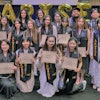Andrés Bonifacio Samahan, a Filipino American student group at San Diego State University, joined a call on Zoom, a videoconferencing platform, for a Q&A session with candidates for their board — a routine meeting before the group’s elections. As one candidate spoke, an anonymous caller with their camera turned off asked, “Hey, do you want to hear a joke?”
What followed was a “flood of voices” saying racial slurs from anonymous accounts, running the gamut from anti-Asian remarks to the N-word, said sophomore Lana Bautista, chairperson of Andrés Bonifacio Samahan.
She remembers one heckler saying, “You all have coronavirus. Every single one of you.”

“We just felt very violated, very attacked,” she said.
But it didn’t end there. When Bautista tweeted about the Zoombombing incident, her inbox filled with hate mail, even death threats.
She got a message from an anonymous Instagram account that called her “morbidly obese,” insisted the coronavirus be referred to as “the China virus” and told her to “keep crying about inevitable systemic racism that Asians will experience on the other side of this.”














